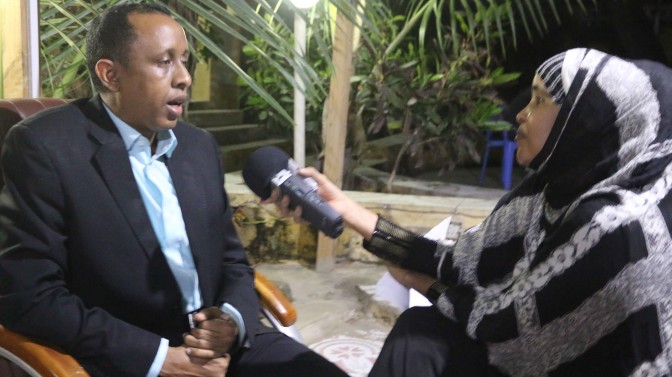Data Room will be ready in December, Petroleum minister says in response to UN report

Recent oil contracts in Somalia have generated debates with the UN calling for a moratorium pending establishment of competent legal regimes and agreements between the Federal government and the regional administrations.
The ministry of Petroleum has been accused of signing oil deals unilaterally and that regional administrations are also doing the same on their own.
Goobjoog News sat down with Petroleum Minister Mohamed Ibrahim Muktar to seek answers on these issues.
Goobjoog News (GN): Could you give us an overview of the ministry’s functions?
Minister: Mineral and petroleum ministry is assigned to work on mineral and petroleum sectors, as we know Somalia is richly endowed with oil resources. The Somali government awarded petroleum concessions to international companies in the 1980s in a bid to explore the country’s oil resources.
GN: What are the ministry’s plans in the year 2015-2016?
As you may know the ministry became autonomous in the year 2014. Before that we were part of at a conglomerate of at least six ministries. When the ministry became independent it adopted a five years plan. This set out the framework for short and long term strategies. Our short term strategy is to build the capacity of the ministry as well as of its staff. To obtain information about petroleum fields in the country as well to form petroleum agencies, for instance we need to re-innovate Somali petroleum agency. We also want to lead the dialogue between Somali Federal government and federal states to reach a resource sharing agreement.
GN: You have come back from a number of foreign trips. What ideas are you bringing home?
Minister: We undertook a number of business trips and we were in mission to share with foreign countries and companies on the progress that we have made. As you know Eeast African countries are experiencing and oil exploration and drilling boom; we need to attract investors and therefore we should give the kind of information they need to make investment choices. Failure to do this, we will not be able to match up with our neighbours in the race to economic development. In 1960s and 1970s, Arab countries benefited hugely from their oil and petroleum resources and now East African countries are in move to realise the same.
GN: There have been reports of improprieties in the Soma Oil and Gas contracts. Could you shed some light on this?
Minister: The agreement between Soma Oil and Gas had two phases. The first face was to collect seismic information about the Somali oil resources and that was concluded. The second phase was to identify petroleum blocks but before they start the second phase, we want to adopt unanimous policy in the oil sector.
GN: The UN Monitoring Report raised questions regarding the conduct of some government officials regarding the Soma Oil deals. Did government initiate any formal investigation on the mentioned officials?
Minister: The government did two things. First Somali Auditor General did an investigation about this report and second Somali Prime-minister formed an independent commission and their findings will be released soon.
GN: What about the civil servants in this ministry that were receiving double salaries? How civil servants take double salaries, one from the ministry and one from Soma Oil and Gas?
Minister: The term used in this report “salary” was not appropriate. The appropriate term was to say incentive. However the ministry salary is not enough for the experts in the ministry.
GN: Soma Oil gave the ministry a sum of $100,000 for the construction of a data room. Did the ministry build the data room?
Minister: The data room will be ready for opening in December. Now we are in the process of renovating it.
GN: Could you tell us about the ASA Spectrum contract signed in September?
Minister: ASA Spectrum was awarded a 28,000km2 area off Somali shores to explore. The company will start operations soon and will explore areas previously under the concession of Shell and Exxon
GN: It appears that both the Federal Government and the State Governments are signing oil contracts each independently. What is the policy?
Minister: Simply this statement is untrue. We are both trying to come up with an agreed upon policy that underlines resource sharing formula. October 21, we started a resources sharing framework process with the federal member states. The formula will detail the arrangement on sharing of resources between the two levels of government. The constitution also provides an overal guideline on this issue.
GN: But at the moment the regional administrations are signing contracts independently with foreign companies.
Minister: Yes that is true. This is what we are going to address in the resource sharing agreement.
GN: How will the resources be shared?
Minister: A commission has been assigned to work on this matter. The commission will propose how to manage and share Somali minerals and petroleum for all the people.
GN: Let’s talk on oil concession agreement with international companies before the collapse of Somali government?
Minister: When the war erupted in 1991 all oil concessions with Somali government were declared force majeure. Now we are in the middle of drafting policies and laws on oil and mineral sectors and when we are done they will come back to the country again. The case of ASA Spectrum as I said is prime example of the big company’s interest in the country. Now Spectrum is doing exploration on behalf of Shell and Exxon.
GN: United Nations Monitoring Group called for a moratorium on Somali oil exploration. What do you make of this?
Minister: I do not have that information. You can tell me.